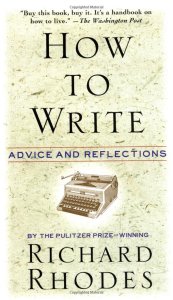By Richard Rhodes. 1996.
Chapter 1: Words Like a Life Rope
If you want to write, you can. Fear stops most people from writing, not lack of talent, whatever that is. Who am I? What right have I to speak? Who will listen to me if I do? You’re a human being, with a unique story to tell, and you have every right. If you speak with passion, many of us will listen. We need stories to live, all of us. We live by story. Yours enlarges the circle.
There are more ways to tell a story than there stories to tell; a story is a map, and maps always simplify.
The challenge is to get from where you are to where you want to be. That probably won’t be easy or quick. Writing is work, hard work, and its rewards are personal more than financial, which means most people have to do it after hours. But if writing is work, learning to write isn’t necessarily painful. To the contrary, silence is pain that writing relieves. Our uniqueness isolates us. writing, we make our way out of our isolation onto the commons that we share. It’s an emotional experience. You stumble gibbering into the valley of the shadow; you pull yourself hand over hand to ecstatic heights. Beyond those terrific passages gathers the community of readers, an open, world community of people–men, women, and children–who want and need to hear.
Writing is only one kind of making. Loving, raising children, doing the work that buys our groceries, are kinds of making as well. But because writing is structured from a common code, it’s more durable than the private events that fill our lives. Books know no hierarchy and abolish space and time. We read Montaigne and know what it was like to be Montaigne, four hundred years ago, and may at least hope that someone will read us and know us four hundred years hence. Only temples and pyramids enjoy such permanence as writing enjoys. Human memory is the only certain immortality; books are memory’s hard copy. … The Iliad has been sung for three thousand years.
Writers are people who write. If you need a place to begin, begin there.
Nor does society encourage the buoyant hypnotic state where the creative imagination floats.
Writing was the answer for me. Somewhere within me I seem to have known that. If you want to write, you may feel that writing is the answer for you as well.
…the process of writing is always a healing process because the function of creation is always, always, the alleviation of pain–the writer’s, first of all, and then the pain of those who read what she has written. Imagination is compassionate. Writing is a form of making, and making humanizes the world.
“Life,” [Viktor] Frankl sums up, “ultimately means taking responsibility to find the right answer to its problems and to fulfill the tasks which it constantly sets for each individual.” Life is action, that is, not abstraction. All these statements apply to writing as well–not surprising, since writing is a simulation of life. (Which is why good writing doesn’t spell out morals; life doesn’t either.)
“I started taking notes,” the Norwegian told him. “That small ordinary act gave me purpose.”
Whatever your purpose, the best remedy for fear of writing, any kind of writing, is the Knickerbocker Rule: ass to chair. If you’re afraid you can’t write, the answer is to write. Every sentence you construct adds weight to the balance pan. If you’re afraid of what other people will think of your efforts, don’t show them until you write your way beyond your fear. If writing a book is impossible, write a chapter. If writing a chapter is impossible, write a page. If writing a page is impossible, write a paragraph. If writing a paragraph is impossible, write a sentence. If writing a sentence is impossible, write a word and teach yourself everything there is to know about that word and then write another, connected word and see where their connection leads. A page a day is a book a year. Listen to that again: a page a day is a book a year.

